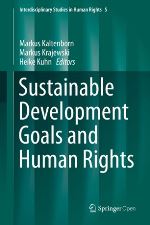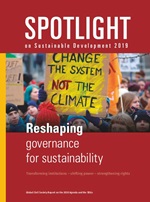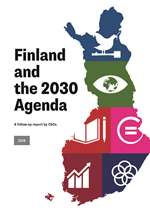Social Watch news
Published on Mon, 2020-02-10 08:31
In the 2030 Agenda governments committed to a revitalized Global Partnership between States and declared that public finance has to play a vital role in achieving the Sustainable Development Goals (SDGs). But in recent decades, the combination of neoliberal ideology, corporate lobbying, business-friendly fiscal policies, tax avoidance and tax evasion has led to a massive weakening of the public sector and its ability to provide essential goods and services and to fulfill its human rights obligations.
Public-private partnerships (PPPs) are promoted as the most efficient way to provide the necessary means for implementing the SDGs, but many studies have shown that privatization and PPPs involve disproportionate risks and costs for the public sector and can even exacerbate inequalities, decrease equitable access to essential services and jeopardize the fulfilment of human rights. An analysis by Jens Martens, from Global Policy Forum.
|
Published on Fri, 2020-02-07 08:56
The formation of the new Lebanese government on 21 January 2020, nearly one hundred days after the eruption of the popular protests, is an important milestone in the first stage of the confrontation between the “revolution” and the authorities. This has raised questions and discussions among activists and groups whether the revolution has made progress, or the formation of the government constitutes a return to the bottom, to pre 17 October period.
So what has the revolution achieved against the regime?
Indeed, the revolution has had accomplishments on two levels, the authorities’ and popular levels.
|
Published on Fri, 2020-02-07 08:23
Social protection, when properly designed, effectively prevents and reduces poverty and inequality highlight Sylvia Beales and Nicola Wiebe (Global Coalition for Social Protection Floors) in the Spotlight report. Guaranteed social protection supports improved nutrition and access to essential services and can therefore interrupt the vicious cycle of poverty and its intergenerational transfer. Universal access rights to social protection means that those at extreme disadvantage can be reached, which contributes to overcoming deeply rooted experiences of discrimination and exclusion, disempowerment and gender inequality. But currently only 29 percent of the global population count on comprehensive social protection over the lifecourse and for the different contingencies that may occur. Fewer than 16 percent of older people in low-income countries have a pension, with older women less likely than older men to receive one.
|
Published on Tue, 2020-02-04 22:27
Arab NGO Network for Development (ANND) issues a statement on the ‘Deal of the Century’ and recalls that an immediate end to Israeli occupation and the recognition of the universal, indivisible and inalienable Palestinian Rights are the foundations of a sustainable Peace in the Middle East.
On January 28th, 2020 the Middle East Peace Plan known as the Deal of the Century was presented by the US President Donald Trump in Washington DC. A “peace” plan that was built unilaterally and that considers the Israeli occupation as the exclusive partner. The “peace” plan markets an illusion of peace at the expense of Palestinian people’s rights and dignity. It gives further impunity to all human rights violations committed by the Israeli occupation, including through legalizing illegal Israeli settlements.
|
Published on Thu, 2020-01-30 10:23
In Finland, the civil society report of Fingo, the association of Finnish development NGOs, concludes that “conflicts of interest between actors lead to decisions where a short-term economic advantage eclipses long-term sustainability.”
Finland claims to be “among the first to draft a national implementation plan, to initiate sustainable development budgeting, to establish an inclusive monitoring system and a citizens’ panel, and commission an external evaluation of the world's first national 2030 Agenda policy, the PATH2030 report published in March 2019”. Yet, the alternative report shows that Finland is not consistently committed to the human rights-based approach of the 2030 Agenda, to ensure that “no one is left behind”. Further, “the 2030 Agenda is widely known about in Finland, but there is no consistent understanding of its interpretation and political significance”.
|
Published on Thu, 2020-01-30 10:08
In India the official VNR's main point is that rapid economic growth has sharply reduced poverty. A 2018 study backs this claim saying extreme poverty is declining in India at rate of 44 people per minute as a result of which, since May 2018, India claims to no longer have the largest number of poor people. Despite this dramatic poverty reduction, over 73 million Indians still live below the international poverty line. Most of these people subsisting on less than US$1.90 a day are in rural areas. Even as the absolute numbers of poor fall there is rapid rise in inequality. A 2018 Oxfam report says India’s richest one percent garnered 73 percent of national wealth generated in 2017.
|
Published on Wed, 2020-01-29 21:51
“The Data Revolution” has been promoted as a vital tool to help to achieve the SDGs or, at least, to better measure progress. Having access to massive amounts of data is seen as helpful for countries to plan, design and implement development and public policies in general. This chapter highlights concerns about this revolution and suggests how to rethink global governance for the digital era.
The redefinition of the principles, norms and policies (software) and the structures and institutions (hardware) of sustainable development governance is closely related to our capacity to adopt new rules and adapt international structures to govern data and Artificial Intelligence (AI) and their impact on our lives and rights.
|
Published on Fri, 2019-12-20 17:20
The numbers provided by the Organization for Economic Cooperation and Development (OECD) about the assistance contributed by its members to developing countries are “inflated”, include “fictional figures”, suffer from “fundamental flaws of overcounting, incoherence and premature implementation of an unfinished system” and have therefore “become incoherent as a statistical quantity”, argues David Scott, former head of the statistical division of the OECD's Development Assistance Committee (DAC) in an article recently published by the Brookings Institution.
|
Published on Thu, 2019-12-19 15:17
The Second Committee of the UN General Assembly, in charge of Economic and Financial Affairs, concluded its 2019 deliberations last November 27. Fifty resolutions were passed and discussion was closed on all but one agenda item: the Revitalization of the UN General Assembly. The range of the resolutions, dealing with sustainable development, macroeconomics, operational activities for development and countries in special situations show that the UN is relevant in macroeconomic and financing matters. More attention will be demanded in the coming year to the issue of Revitalization of the work of the General Assembly through the lens of coordination for sustainable development, while the old debate about the role of consensus in the Committee’s deliberations was reopened.
|
Published on Sun, 2019-12-15 19:09
In Jordan the plans are good but just not implemented. The submission of the Voluntary National Review in 2017 was an opportunity "to further strengthen national ownership of the 2030 Agenda, build a proactive momentum around it, and accelerate its realization”. The preparation of the VNR “ensured the widest participation of all major groups and organizations” according to the report by the Phenix Center for Economic and Informatics Studies. This report was “a remarkable step forward in creating an inclusive strategy to achieve the SDGs” but “the lack of concrete and effective implementation of this strategy, as well as the failure in implementing an effective monitoring system, dramatically affected its effectiveness as a tool for integrating the SDGs in the national agenda”.
|
SUSCRIBE TO OUR NEWSLETTER
Submit

|










